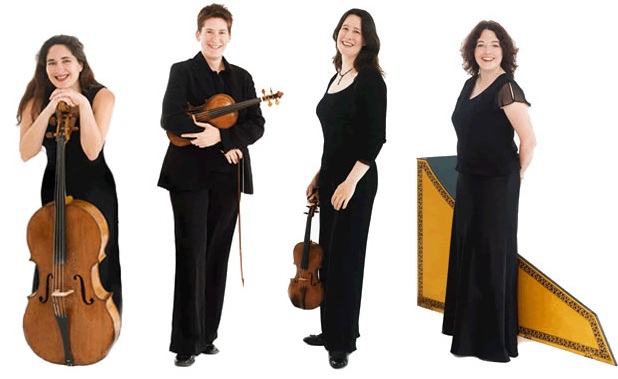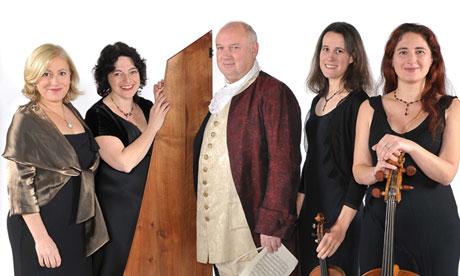What if Handel, after his death, descended to an eminently civilised afterlife, where he spent his time making music and new friends with the likes of Beethoven and even Jimi Hendrix? That’s the premise of Louis de Bernières’ new play Mr Handel, a show that brings the author himself together with baroque chamber group The Brook Street Band and soprano Nicki Kennedy in a gentle meander through the life and works of baroque’s finest.
It’s Christmas, and novelty shows are all around, if you can find them among the ubiquitous pantomimes and West End shows screaming ever louder for the attention of the crowds of shoppers and tourists. So something like de Bernières’ project should be perfect – a thinking (wo)man’s evening out complete with some none-too-taxing music, a healthy serving of anecdotes and a much-loved English novelist. Which makes it all the more galling that this could-be-so-good show just isn’t, as yet. If I were the blunt and choleric Handel I might even go so far as to call it a bloody mess.
Pacing was faltering, drama muted and characterisation oddly half-hearted
For a start it’s far too long. Admittedly the composer himself could have taken some lessons on this score, but that’s no excuse for a homage whose audience needs little imagination to situate itself in de Bernières’ fictional underworld. Handel’s biography is as slim on fact as it is fat on anecdote, and there’s nothing in the rather episodic structure that would suffer from a ruthless edit.
 Then there’s the delivery. A one-man show is hard enough for a seasoned actor to carry, but for an amateur like de Bernières (pictured right) it proves an impossibility. Pacing was faltering, drama muted and characterisation oddly half-hearted. It would have been far better had he written his script and handed it over to someone else – I’m sure Simon Callow could have been persuaded to take an evening off from being Dickens to don Mr Handel’s periwig. And the Wigmore Hall, for all its many charms, doesn’t lend itself to any kind of drama. The sight-lines just aren’t there, and judging by passing interval comments few of the elderly patrons could hear what de Bernières was saying, which left jokes falling flat and an ongoing bit of period business about the unseemliness of female musicians (“trollops and tarts tinkling…jades a jangling”) feeling not a little misjudged.
Then there’s the delivery. A one-man show is hard enough for a seasoned actor to carry, but for an amateur like de Bernières (pictured right) it proves an impossibility. Pacing was faltering, drama muted and characterisation oddly half-hearted. It would have been far better had he written his script and handed it over to someone else – I’m sure Simon Callow could have been persuaded to take an evening off from being Dickens to don Mr Handel’s periwig. And the Wigmore Hall, for all its many charms, doesn’t lend itself to any kind of drama. The sight-lines just aren’t there, and judging by passing interval comments few of the elderly patrons could hear what de Bernières was saying, which left jokes falling flat and an ongoing bit of period business about the unseemliness of female musicians (“trollops and tarts tinkling…jades a jangling”) feeling not a little misjudged.
The Brook Street Band are a dynamic young all-female group and the love they feel for this repertoire shows as clearly on their faces as in their playing. A pleasingly varied programme of musical works and excerpts offered us part of one of Corelli’s gorgeous and often-neglected trio sonatas. Two violins (Rachel Harris and Farran Scott) sparred with ferocious artistry in a baroque fight to the death – a foil to the languorous suspension sequences of Handel’s Sinfonia in B flat major that saw them engaged in a protracted musical game of kiss-chase.
 Harris, cellist Tatty Theo and Carolyn Gibley at the harpsichord were free with their virtuosity, and it would have been lovely to see second violin Scott setting aside her somewhat timorous approach (which translated too often into playing too softly and slightly under the note) and joining them. Cracks began to show across the group more generally in a C minor trio sonata from Bach’s Musical Offering. Less forgiving to a lack of rehearsal than Handel, Bach’s angular counterpoint exposed some problems with tone and tuning, and a waggish stranger behind me speculated whether Herr Handel had slipped the musicians a fiver each backstage to ensure that his music sounded better than that of his rival.
Harris, cellist Tatty Theo and Carolyn Gibley at the harpsichord were free with their virtuosity, and it would have been lovely to see second violin Scott setting aside her somewhat timorous approach (which translated too often into playing too softly and slightly under the note) and joining them. Cracks began to show across the group more generally in a C minor trio sonata from Bach’s Musical Offering. Less forgiving to a lack of rehearsal than Handel, Bach’s angular counterpoint exposed some problems with tone and tuning, and a waggish stranger behind me speculated whether Herr Handel had slipped the musicians a fiver each backstage to ensure that his music sounded better than that of his rival.
Soprano Nicki Kennedy was a good addition to proceedings, standing gamely in for Cuzzoni in the narrative and allowing herself to be bodily threatened with defenestration for insubordination in rehearsals. Her L’ascia ch’io pianga was assured, but she really came into her own for the muscular coloratura of the closing Alleluja from Handel’s cantata Coelestis dum spira aura which was impeccably articulated. She also gets serious kudos for being a good sport and giving Hendrix’s "Purple Haze" her best shot…
If all this criticism of what is in essence a bit of cultural fun, an amuse-bouche of a Christmas concert seems unduly harsh and curmudgeonly, then it’s only because this could so easily be a wonderful show with just the simplest of tweakings, tuckings and tightenings. As it is, I think perhaps someone needs to threaten de Bernières with a little light defenestration by way of persuasion.















Add comment